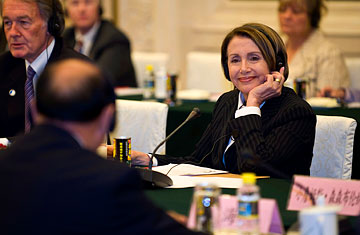
U.S. House Speaker Nancy Pelosi attends a climate-change conference in Beijing on May 27, 2009
In a speech on Tuesday at a Beijing conference on climate change, U.S. House Speaker Nancy Pelosi said that global warming "is a game changer in the U.S.-China relationship." For the California Democrat's relationship with China, it already has been. She has gone from being one of the most officially reviled public figures in China to someone who is tolerated, if not exactly celebrated. (Watch TIME's video "Olympic Torch: Back on Chinese Soil.")
A year ago, Pelosi was labeled a "disgusting figure" in a commentary by the state-run Xinhua news service. Her longtime support of human rights — as a U.S. Representative in 1991, she helped unveil a banner in Tiananmen Square honoring "those who died for democracy in China" — is seen by some mainland observers as a means to intimidate the country. When riots erupted across Tibet in March 2008, Pelosi met with the Dalai Lama in India and denounced China, calling on the world to pressure the Chinese leadership. Xinhua responded by saying that "she confused right with wrong on ... Tibet, held double standards to interfere in China's internal affairs (and) hurt the feelings of the Chinese people and impaired China-U.S. relations." (See pictures from the Dalai Lama's 60 years as a leader.)
Ahead of this week's visit to China, Pelosi's first as Speaker of the House, there was some nervousness in China that the high-ranking Democrat would publicly raise human-rights concerns at a sensitive time in Beijing — just one week before the 20th anniversary of the Tiananmen massacre. But thus far, the American politician, who is facing questions at home about what she knew of the CIA's waterboarding of terrorism suspects, has given her hosts little to worry about. When she did mention human rights, it was in the broad context of international relations, rather than specific criticism of China's record. "In every country, not just China and the U.S., the global climate crisis is best surmounted with transparency and openness, respect for the rule of law and accountability to the people," she said in her Beijing talk.
The new approach has been welcomed in China. "At the beginning, I was surprised," says Zhu Feng, a international studies professor at Peking University. "She is a big mouth and a very harsh critic of Chinese human rights and Tibetan issues." Zhu believes that the environment will be a key issue in the future of Sino-U.S. relations and that Pelosi is smart to embrace it. Her approach follows the tack taken by Hillary Clinton in February during her first visit to China as U.S. Secretary of State. Clinton, who has also been critical of China's human-rights record, said she wasn't going to allow the issue to hamper cooperation on climate change and the global economic crisis.
Still, Chinese observers aren't ready to declare a new era in relations with the U.S. "I think it's evidence of a broader approach," says Zhu. "For Hillary Clinton and Nancy Pelosi, the human-rights tool remains on the table, but this time they pick up another one from the tool kit. I don't think their deliberate silence over the human-rights controversies between two countries means that now human-rights differences are truly fading away. The stipulation is when it will be coming back."
Indeed, ahead of Pelosi's arrival in Beijing, there were signs that the issue still inflames passions. News footage shot outside a Beijing train station showed hundreds of petitioners — people who regularly come to the capital to ask the central government to right injustices they face at home — protesting on the street. One group held up a sign that read, "Welcome Pelosi. Pay close attention to human rights. SOS."
